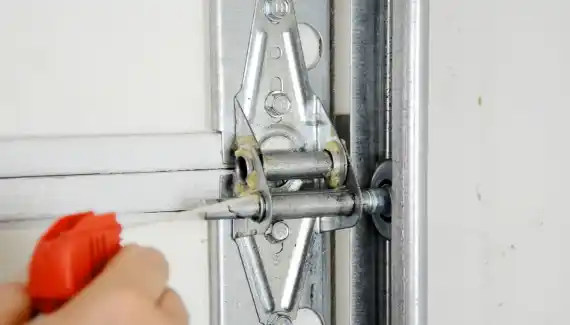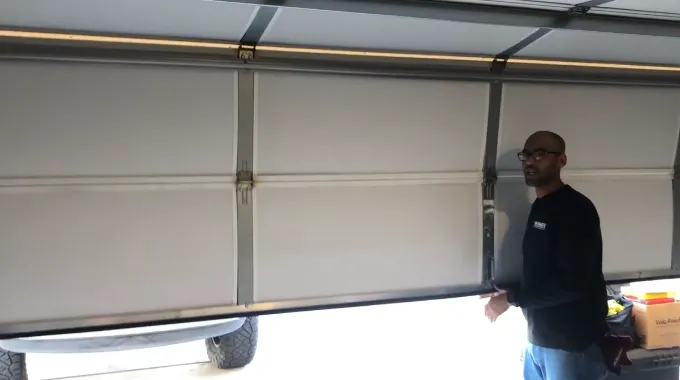Last Updated on April 12, 2023
Are you trying to lift your garage door and feeling like it weighs a ton? You’re not alone. It’s a common issue caused by a few different causes.
There are a variety of potential causes for your garage door to feel heavier than usual. Properly evaluate and address each issue, from overloading the springs or bent tracks to rust or lack of maintenance, to achieve optimal performance from your garage door.
We’ll explore why your garage door is so heavy to lift, the potential causes, and their solutions. Many factors can contribute to an overly heavy garage door, from worn-out springs to misaligned components and weather conditions.
Let’s look at common reasons why your garage door feels heavier than usual and explore possible solutions.
Why Your Garage Door is So Heavy To Lift: Reasons & Solutions

From worn-out springs to faulty cables and tracks, there are several reasons why your garage door may be heavy to lift. Fortunately, there are solutions available that can help make the process easier.
01: Overloading of Springs
Garage doors are designed with springs that act as a counterbalance, allowing the door to smoothly open and close. If too much weight is put on the door, such as by having multiple people pushing or pulling it, the springs will become overloaded and unable to support the additional weight.
The result is a heavy garage door that can be difficult to lift. To solve this problem, be sure to keep your garage door manageable, and only one person should open or close it at any given time.
If your spring system has been damaged due to overloading, you may need to replace them to restore balance and ease of use.
02: Worn Out Springs
Worn-out springs are a common cause of excessively heavy garage doors. Over time, the tension in the springs can weaken, resulting in an unbalanced system that makes lifting the door difficult.
If your springs appear corroded or show signs of fatigue, you should consider replacing them immediately before they fail and leave your garage door stuck in one position.
Replacing worn-out springs with new ones will help restore balance and reduce strain on the system when opening or closing your garage door.
03: Broken Spring
A broken spring is another common cause for a heavy garage door that cannot be lifted easily. If only one spring is broken or has malfunctioned, it can make it harder for you to lift up the entire door since there’s less tension on either side of the system due to a lack of balance.
To fix this issue, you must replace both sides of your spring system, even if only one has broken. Otherwise, you could end up damaging other components while attempting to open or close them manually.
04: Bent Or Damaged Tracks

Bent or damaged tracks are also a frequent cause of excessive weight on a garage door. They can become clogged with debris over time or run into something during movement, preventing them from rolling properly when the door is opened or closed.
Inspection of both tracks is necessary to resolve this issue. Ensure each track is in good working order by looking inside and outside for signs of damage or obstructions.
If any debris has built up around the tracks, remove it before proceeding. Doing so will help ensure that they function correctly again, which will lead to an easier opening/closing experience overall
05: Dirty or Clogged Tracks
Dirt and debris can accumulate in the tracks of a garage door, making it heavier to lift. This is because the buildup of dirt and debris prevents the rollers from moving smoothly along the track, causing a drag on the door. To fix this issue, use a vacuum cleaner to remove all debris from the tracks.
Clean away any oil or grease buildup with a rag soaked in mineral spirits. Finally, lubricate the track with WD-40 or a specialized garage door lubricant to ensure smooth movement.
06: Worn-Out Rollers
Garage door rollers can become worn out over time, which makes them less effective at supporting your garage door’s weight. To fix this problem, inspect each roller for signs of wear, such as cracks or chips on the surface.
If any of these signs are present, replace the roller with one that is more durable and made specifically for your garage door system. Lubricate each roller to reduce friction and make your garage door easier to open and close.
07: Damaged Opener
A broken or damaged opener can cause your garage door to be heavier than average when opening and closing it. To identify if there is damage to the opener, check for frayed wiring or loose connection points inside the unit itself.
If damage is found, contact a professional technician for repairs as soon as possible. Test your opener after complete repair to confirm proper operation before operating your garage door again.
08: Loose Hardware

If any of the hardware that supports your garage door is loose due to improper installation or general degradation. Then it may provoke your garage door to be more difficult to lift than normal when lifting it up or down.
To determine if any hardware should be tightened, inspect each part carefully and secure any fasteners that have become loose over time with a wrench. Look out for worn-out parts that may need replacing to ensure optimal operation of your garage door system overall.
09: Improper Balance
If the garage door is too heavy to lift, it may be due to improper balance. This could mean that the springs are too tight or not wound properly. The springs need to be adjusted to be evenly balanced to solve this issue.
This can be done by winding the springs tighter or loosening them until the weight and balance of the door are even throughout its travel. Another solution is to replace old springs with new ones. This will ensure that the proper amount of tension and balance is applied.
10: Incorrect Installation
Another common reason for a garage door that is too heavy to lift is incorrect installation. If certain components, such as counterweights or cable drums, were not installed correctly, it could severely affect the weight distribution of the door and make it much harder to open.
All components must be properly installed according to the manufacturer’s instructions to fix this issue. Any broken or worn parts should be replaced as soon as possible to ensure a smooth operation.
11: Age, Rust, and Warping
As time passes, age, rust, and warping can all contribute to an excessively heavy garage door. As metal parts start to rust, they begin to corrode and become heavier over time; warping can also increase a door’s overall weight if panels become bent or misshapen due to extreme temperatures or other environmental factors.
The best way to address these issues is by inspection and maintenance; check for rust spots on metal components regularly and apply a rust inhibitor as needed.
If panels have warped significantly, then replacing them or repairing them may be necessary for your garage door system to operate safely and efficiently again.
12: Lack of Maintenance

Lack of maintenance can also lead to a heavy garage door that is difficult to lift open. Regularly lubricate all moving parts, such as hinges, tracks, rollers, etc., to prevent corrosion over time. Also, to keep things running smoothly and make opening/closing much easier.
Checking for balanced tension on your springs once every few months will help keep your door light enough, so you don’t strain yourself while lifting it open/closed repeatedly throughout its lifetime.
13: Incorrect Weight Distribution
One of the most common reasons garage doors are so heavy to lift is incorrect weight distribution. This can be caused by several factors, including a malfunctioning opener, a misaligned track, or even an unevenly balanced spring system.
When the weight of the door is not evenly distributed across the tracks and springs, it will cause the door to be heavier than usual when lifted.
To solve this problem, check all components of your garage door setup and make sure they are properly aligned and balanced. If necessary, you may need to replace any worn-out parts or install a new opener.
14: Excessive Weight
Garage doors that are particularly large or made from heavy materials can also be difficult to lift due to excessive weight. This can range from thick insulated doors with multiple panels to steel doors that weigh hundreds of pounds.
If your door falls into this category, then there’s, unfortunately, no quick-fix solution other than replacing it with a lighter model. Bear in mind that investing in a lighter alternative can also lead to long-term savings since less energy will be used when opening and closing the door.
15: Misaligned Components
If your garage door has been installed incorrectly, then chances are its components may not be correctly aligned either. An improperly aligned track, for example, can cause extra strain on the springs. This, in return, causes more pressure on the door itself, making it harder to lift than usual.
To rectify this issue, you should first inspect all parts, such as hinges, tracks, and brackets, for any signs of wear or tear before attempting to realign them yourself or calling in a professional technician if needed.
16: Weather Conditions
Due to increased friction between moving parts and warped materials, extreme temperatures, and high humidity levels can also make it difficult to open a garage door.
In these cases, you may find that adding lubricant or cleaning off dirt buildup helps reduce resistance. Still, if possible, it’s best avoided altogether by opting for weatherproof materials like vinyl whenever possible during installation.
What Affects a Garage Door Weight?

Various factors, including size, material, steel gauge, thickness, insulation, and glass, determine garage door weight. Steel garage doors are the most common type of garage door and typically weigh around 80 pounds to 130 pounds for a single door and 150 pounds to 225 pounds for double garage doors.
Aluminum garage doors are lighter than steel and usually weigh between 70-100 pounds for a single-car door and 100-150 pounds for two-car doors. Wooden garage doors are known for their weight, with a standard 2-car garage door weighing an average of 500 pounds.
This is substantially heavier than other materials, such as steel or aluminum. Insulated garage doors are also heavier than non-insulated ones due to the added insulation. The average modern steel single-car door weighs around 125 pounds, while insulated versions can weigh up to 200 pounds.
The weight of a garage door can vary greatly depending on its size, materials used, insulation level, and other factors. Springs play an important role in counterbalancing the weight of your garage door so that it can be easily opened.
The spring size should be chosen based on the weight of your garage door so that it can properly support it when opening or closing. If you have an older or heavier garage door model, you may need larger springs to ensure smooth operation.
Can a Garage Door Be Too Heavy for a Garage Door Opener?
A garage door can be too heavy for an automatic garage door opener. If the garage door is large and has features such as windows or insulation, it can become excessively heavy for the opener to lift.
A 1/2 horsepower garage door opener can typically lift up to 300 pounds, which is the average weight of a two-car steel door.
If the door’s weight exceeds this amount, it may be too heavy to be lifted by the opener. You may need to adjust or replace your garage door springs to reduce your door’s weight.
Make Your Garage Door Open Easier
Your garage door is essential to the security of your home, so ensuring it’s running properly should be a priority. Regular maintenance and occasional upgrades can go far in keeping it working well. It helps to understand why these things are necessary to ensure your home’s systems perform as well as they can.
Keep your garage door in tip-top shape by giving it the TLC it needs. Check for any issues like faulty springs, dented tracks, worn rollers, and loose hardware that may prevent easy opening. Plus, don’t forget to pay attention to correct weight distributions, an essential part of hassle-free operation down the road.
With regular upkeep and check-ups, you can ensure your garage door will be smoothly opening for many years. No one wants nasty surprises, so make sure it’s always in tip-top shape.

